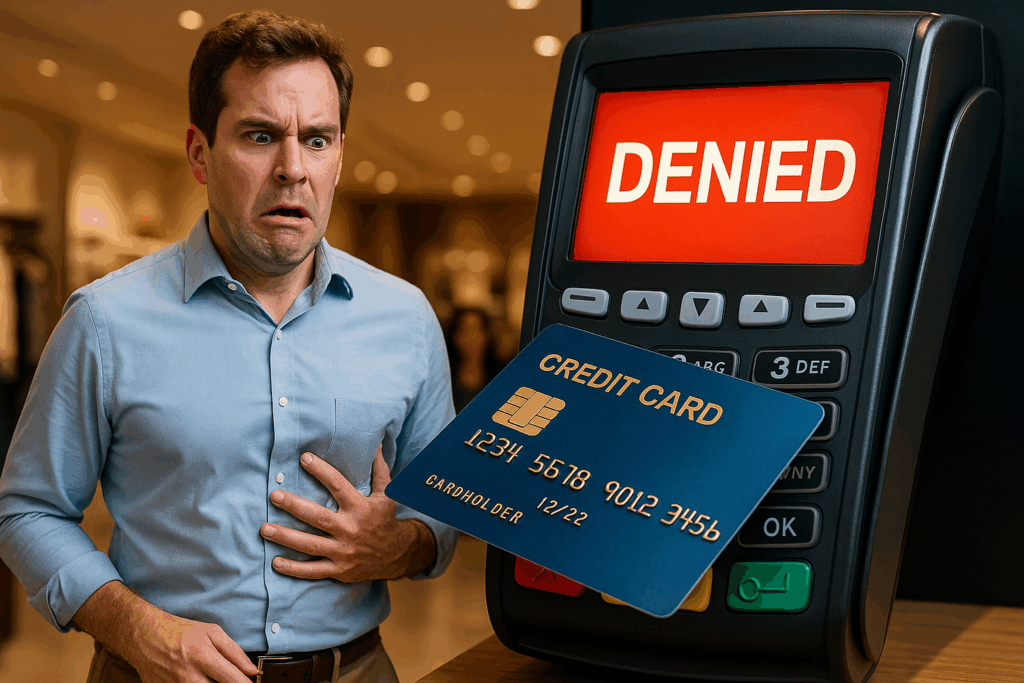Why Did I Get Denied for a Credit Card?

Applying for a credit card and getting denied can feel frustrating—especially when you don’t understand why it happened. If you’ve been turned down, you’re not alone. Millions of Americans face credit card denials every year, often without clear explanations.

Credit Denied? Don’t Panic—There’s a Path Forward
Rejection doesn’t have to be the end of your credit journey. In fact, it can be a wake-up call that helps you build a stronger foundation.
At CreditNerds.com, we help people just like you repair and rebuild their credit—often for less than you’d expect. Our pay-per-deletion model means you don’t pay unless we get results. Learn more at www.CreditNerds.com/FAQ.
Now, let’s unpack the most common reasons credit card applications are declined—and what you can do about it.
1. Low Credit Score or Thin Credit History
Your credit score is one of the first things a lender looks at. If your score is too low or if you don’t have much credit history at all, it can trigger an automatic denial.
Why it matters:
Credit card issuers want to see a history of responsible borrowing. Without it, they don’t know how risky you might be.
What to do:
- Start with a secured credit card or credit builder loan.
- Check your score at all three major bureaus (Experian, Equifax, and TransUnion).
- Dispute any errors you find. (Which we can help with!)
2. High Debt-to-Income Ratio (DTI)
Even if you’ve never missed a payment, carrying too much debt compared to your income can work against you.
Why it matters:
A high DTI signals to lenders that you may already be overextended and could struggle to manage new debt.
What to do:
- Focus on paying down existing debt.
- Avoid applying for new credit until your DTI improves.
- Consider increasing your income or reducing expenses.
3. Recent Late Payments or Derogatory Marks
Late payments, collections, charge-offs, and other negative items on your credit report are major red flags to lenders.
Why it matters:
These entries suggest you’ve had trouble repaying debt in the past, which makes lenders cautious about extending more credit.
What to do:
- Make all future payments on time.
- Work with a company like CreditNerds.com to dispute or remove inaccurate or outdated negative marks.
- Request goodwill removals if your history was otherwise positive.
4. Too Many Recent Credit Inquiries
Every time you apply for credit, it creates a “hard inquiry” on your credit report. A single inquiry isn’t a big deal, but several within a short time can raise concerns.
Why it matters:
Lenders may worry that you’re desperate for credit or taking on too many obligations at once.
What to do:
- Space out your credit applications.
- Check for pre-qualification offers that use “soft pulls” instead.
- Focus on improving your credit before applying again.
5. Unstable Employment or Income
If your income is inconsistent or hard to verify, a credit card company may see you as a higher risk.
Why it matters:
Lenders want to feel confident that you can afford to pay your bills, especially if you experience a financial emergency.
What to do:
- Consider applying with proof of consistent income (pay stubs, contracts, etc.).
- If you’re self-employed, provide tax returns or bank statements.
- Build up savings or a co-signer if needed.
6. Application Errors or Mismatched Information
Believe it or not, simple typos or inconsistent info (like different addresses or mismatched names) can cause a denial.
Why it matters:
Lenders rely on accurate data to verify your identity and assess risk. Any red flags might result in automatic denial.
What to do:
- Double-check your application before submitting.
- Make sure all your credit bureau records are consistent.
- Use your legal name and correct address format.
What If You’ve Been Denied Already?
If your application was rejected, the lender is required by law to send you a written explanation (called an “adverse action notice”) explaining the key reasons why. Review it carefully.
Next Steps:
- Make a plan to fix or address the listed reasons.
- Don’t rush to reapply. Instead, prepare strategically.
Ready to Turn That “No” Into a “Yes”?
Let us take a look at your credit for free. No pressure. No commitment. Just honest answers and a clear path forward.
👉 Book Your Free Consultation at www.CreditNerds.com/Start!

